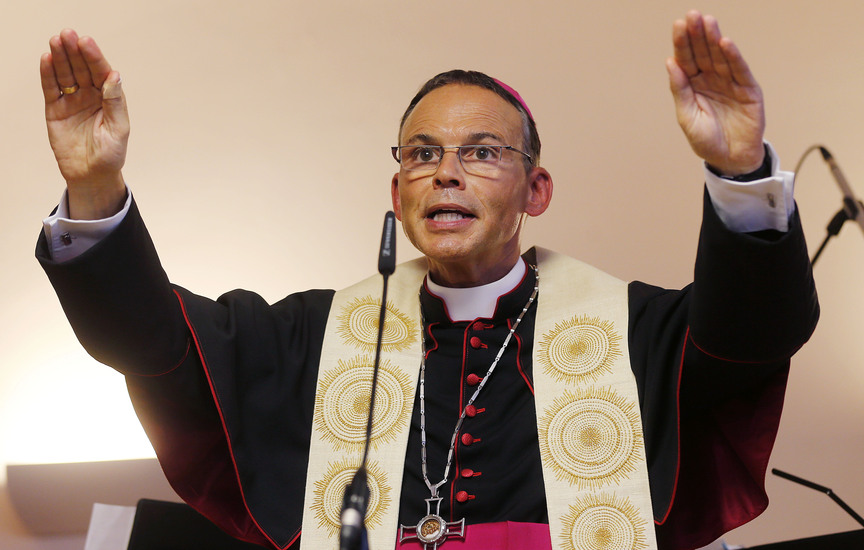When Bishop Franz-Peter Tebartz-van Elst of Germany traveled to India last year to minister to poor slum dwellers, he reportedly flew first class.
This year, renovations of the Roman Catholic bishop’s church-owned residence in the city of Limburg ran massively over budget to cover $620,000 worth of artwork, $1.1 million in landscaping and last-minute design revisions — $42 million in all, billed to the Vatican and German taxpayers, Hamburg’s tabloid daily Bild reported.
Dubbed the “Bishop of Bling” by European media that have been avidly tracking the bespectacled clergyman’s lavish lifestyle, Tebartz-van Elst was suspended from his post by Pope Francis on Wednesday in a clear sign that the new pontiff is serious about diverting resources from the “princes of the church” to the paupers in its congregations.
Tebartz-van Elst flew to Rome this month – on budget carrier easyJet, Britain’s Guardian newspaper reported – to explain his finances to the pope after a Vatican delegation was dispatched last month to investigate what had become an embarrassing scandal for the church.
The bishop was forced to wait a week before getting his papal audience Monday, from which he emerged to tell reporters at the Vatican that his fate was “in the hands of the pope.”
On Wednesday, the Vatican issued a statement saying Tebartz-van Elst was taking an unspecified leave because “a situation has been created in which the bishop can no longer exercise his episcopal duties.”
There was no word on how long the bishop will be suspended or any indication of where he will spend his imposed hiatus. One German politician suggested Tebartz-van Elst might want to familiarize himself with the humility advocated by Francis by serving his suspension in an impoverished Third World ministry.
“Perhaps one could recommend to the bishop that he take over a diocese in Africa, where he can win back his credibility,” Heiner Geissler, a former secretary of the Christian Democratic Union headed by German Chancellor Angela Merkel, told ARD television.
The spending scandal has rocked the German government as well as the church hierarchy, as German churchgoers are compelled to pay a tax to the state that is used to cover government-administrated religious expenses. Berlin collects more than $6 billion a year for the Catholic Church from those who identify themselves as church members on their tax forms. A significant number have struck their names from the Catholic registry in recent years, though, in protest of the worldwide clergy sexual scandal.
German church leaders welcomed the decision to remove Tebartz-van Elst, some indicating that they didn’t expect him to return to his bishopric in Limburg, about 50 miles northwest of Frankfurt.
“Pope Francis’ decision offers the chance of a first step toward a new beginning in the Limburg diocese, because the situation has become an increasing burden for the faithful there, and in all of Germany, over recent weeks,” Alois Glueck, head of the Central Committee of German Catholics lay organization, told the German international broadcaster Deutsche Welle.
Der Spiegel magazine, whose report on the India trip headlined “First Class to the Slums” prompted Tebartz-van Elst to sue the publication, noted in its most recent edition that the bishop now faces charges of making false statements in affidavits filed with a Hamburg court.
Theological scholars say the bishop’s suspension will send shock waves through the church hierarchy and underscore Francis’ message that the clergy, who have traditionally maintained social distance from the laity, are to present a more humble profile to their parishioners.
“In many parts of Asia and Africa, Catholic bishops live lifestyles of great luxury while the laity live in poverty. Catholic bishops often have cars and drivers, air-conditioned homes and servants,” Mathew Schmalz, a religious studies professor at the College of the Holy Cross in Worcester, Mass., said in an interview. “What we might be seeing now is the beginning of a move not only to discipline bishops who live in luxury but to divest the Catholic Church of its wealth.”
In an in-depth account of what it termed Tebartz-van Elst’s “prayers to riches” scandal, the Irish Times said the controversy is “casting a critical spotlight on the German Catholic Church and asking if its considerable wealth is compatible with the policies of the new pope.”
Schmalz says the faithful can conclude from the bishop’s fate that “Pope Francis says what he means, and means what he says, when he talks about Catholicism becoming a ‘church of the poor.’”
Send questions/comments to the editors.



Success. Please wait for the page to reload. If the page does not reload within 5 seconds, please refresh the page.
Enter your email and password to access comments.
Hi, to comment on stories you must . This profile is in addition to your subscription and website login.
Already have a commenting profile? .
Invalid username/password.
Please check your email to confirm and complete your registration.
Only subscribers are eligible to post comments. Please subscribe or login first for digital access. Here’s why.
Use the form below to reset your password. When you've submitted your account email, we will send an email with a reset code.